Dolores Puértolas shares this good news from Sabana Yegua.
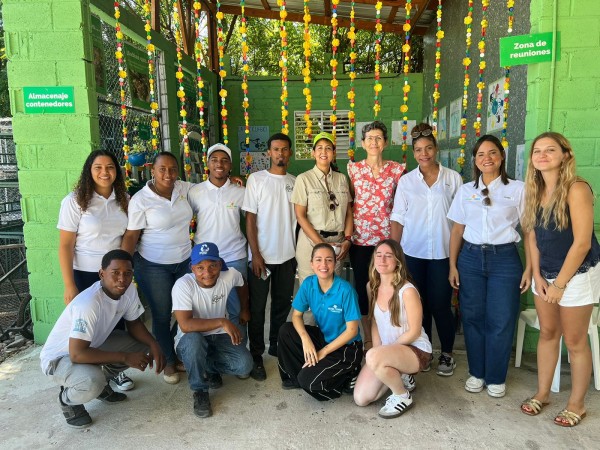
This summer that has just ended has been even more vibrant than the previous ones in Sabana Yegua. It is a time of visits and very fruitful encounters for both the local community and for the people who visit us from different countries. These are the different groups that have visited us from abroad in recent months.
Seminarians from the Archdiocese of Milwaukee. In what has already been configured as a mission experience and a linguistic immersion, six young men in preparation for the priesthood spent two months with us. The first month they took a Spanish course in Santiago de los Caballeros, in the north of the country, through the Catholic College Pontificia Universidad Madre y Maestra. The other month they collaborated in the different activities of the La Sagrada Familia Parish. The cultural and religious experience, the experience of diversity and the universality of the Church is what the seminarians value most in their time in these lands.
Sonríe y Crece Association. This is a group of volunteers from Spain who for 15 years have been visiting the Dominican Republic in the summer. Once here, they carry out a school reinforcement programme in the mornings and games for children in the afternoons, through which they transmit values and educate the little ones. They have also given talks on how to build houses safely to cope with the Caribbean hurricane season and activities to promote health and physiotherapy. Every year, young Spaniards from different professions dedicate themselves for two months to sharing their knowledge and friendship with the children and young people of Sabana Yegua. What they highlight most is the wonderful experience of having dinner with the children's different families, the excursions to climb the hill near the town with the little ones, as well as being able to get to know the warm culture of the country.
ESADE SUD interns. We have been collaborating with this Spanish Business School for four years: for three months, two interns who are about to finish their studies work at the Eco-hotel and retreat house Altos de la Caobita of the Community of Saint Paul in Barrera, located within the parish territory of La Sagrada Familia. This year they helped to improve the internal organization, create new products and promote the project. This year, we also started collaborating with the plastic recycling program “Reciclaplus” and created ecological packages to learn about the recycling initiative.
Professors from the Polytechnic University of Catalonia. For the first time, two professors from the UPC School of Agronomy visited us to collaborate with the eco-hotel and develop a plan for varied crops that can be replicated in the communities, optimizing the use of water, a resource that is so scarce here in the South of the Dominican Republic. These were two intense weeks of a lot of learning and now it is time to get down to work with the plan we have drawn up.
We are grateful for these many contributions, which leave us with a deep feeling of friendship and are proof of the solidarity that so many people are eager to offer and share.
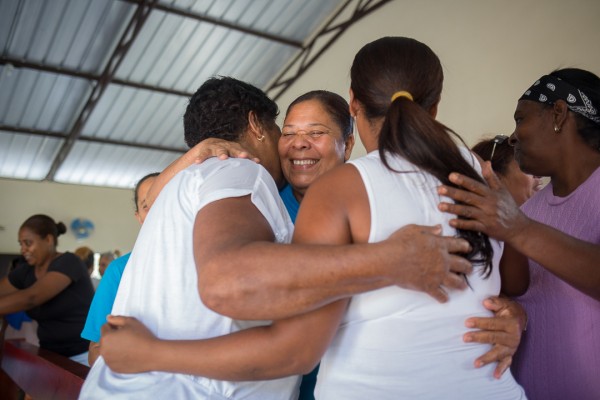
In the Catholic Church it is traditional to encourage people to make some special sacrifice during the season of Lent, this time that we started this week with the celebration of Ash Wednesday. There are those who decide that while Lent lasts they will give up sweets, or smoking, or alcohol. It reminds me of the sacrifices my mother made when she was little: she put stones in her shoes and tied a tight rope around her the waist, things like that. I don't know how long it would last, certainly not long, and that perhaps these were girlish things, but when she told me about it, I didn't quite understand the notion of sacrifice that these practices entailed. As a teenager, I decided that this was not for me, that God was not asking me to perform these sacrifices.
Sacrifice is a ritual, and as such it has its content and its spirituality, and although in my adolescent rebellion I did not see it, rituals are part of life, more useful and valuable for some than for others. As a friend used to say, making a Lenten effort of self-discipline, even in eating or drinking, is not bad, since it shows that you can exercise your will over your body.
Another friend shared the reflection that the liturgical cycles of the Church are not always lived in the year, but that our lives have stages of each cycle: stages of sacrifice, reflection, containment, such as Lent, stages of sadness and mourning, like Good Friday, and stages of new life and joy like Easter Sunday. It is also true that, with the pandemic, we are living a long period of moderation in many ways, of containment, sadness, and pain. So, there is sacrifice, like it or not!
This year, in the days leading up to Lent, I was planning to carry out a double purpose, my personal “sacrifice”, and I share it with you.
On the one hand, I have decided that when I start a dialogue about politics, or religion, or economics, from the beginning I should be willing to learn what another person can teach me; be willing to modify my opinion, or even change it. That would be a real dialogue. Because if I come to the dialogue with all my firm and immovable ideas, what dialogue will that be? Recently the bishop of Madison, Donald J. Hying, sent a letter to all the priests of his diocese warning of the disunity and polarization that exists today in the Catholic Church in the USA. It would seem that now there are "Trump Catholics" and "Biden Catholics," Hying says. In his letter he states that any moderate opinion and any attempt to reach an intermediate position is now seen as a betrayal of the truth. “The painful experience of these past months tells me that we as fallen human beings can become divisively tribal. We instinctively associate with the people who think, act, and live as we do. ” Along these lines, I repeat the first purpose: to start any dialogue with a sincere attitude of openness to the other, being willing to change your mind, to understand, to empathize with other points of view.
On the other hand, I have a similar purpose, but more in line with judging people -rather than their opinions. In daily interactions with others, we find a thousand reasons to judge negatively not only an idea or a political position, but an action, a feeling, an emotion. My proposal for this Lent is to generate empathy looking for a virtue, something positive, in all those with whom I interact. Every time a negative judgment about someone assails me, I will search until I find a virtue, a gift, a quality, an ability that that person has and is worthy of praise or even imitation. Thus, my judgments (although I know that, in fact, I should not judge at all) will be more balanced and empathetic with the other person.
In conclusion, my two-fold purpose for this Lent is to build bridges of union with others: bridges between my opinions and those of the other people, and bridges of empathy with the feelings and actions of others, thus balancing the possible negative judgments with the positive ones. Piece of cake, right? Have a great Lent!
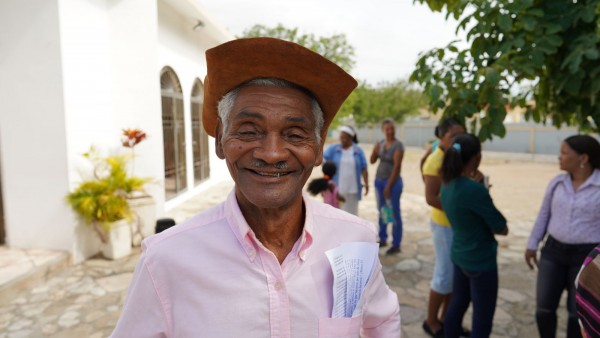
Chance has led me to read, on the same day, two writings that spoke of “defending joy”, and they have stirred something that I had been pondering for a long time.
Defending joy is actually the title of a beautiful poem by Mario Benedetti that I invite you to reread. A text without waste, but let me mention two sentences. The first says: “defend the joy from endemics and academies.” Here, he could almost have said, from pandemics—and would be hitting the mark. Benedetti invites us to continue defending joy despite all that we are experiencing worldwide. Despite all the forecasts of scientists and scholars (the academies) that alert us that difficult times will continue. It is defending joy as a deep conviction that all humanity struggles and moves forward despite the pain and death that surrounds us. It is defending joy as something that one is born with and that one cultivates throughout life and helps him or her to cope with the worst gales. It is to defend the joy of passivity, of the entrenched complaint, of acrimony, of the pessimistic pose in life that only sees problems and misfortunes around and does not see everything that oneself causes or does not avoid.
The first text that I have now read is an article by María de la Válgoma in the magazine Vida Nueva titled “Defend joy”. He quotes Saint Isidore of Seville, who says that joy expands the heart. In the first dictionary of the Castilian language, joy is openness of mind to let the loved object enter. In other words, the joy is expansive. What a relief! I hope sadness is not!
And the same article quotes Rosa Montero, who in a television interview said that happiness is a habit. But there I say: be careful! I remember a friend who had a family slogan: you must be happy! As if not being cheerful was rude. Like, no matter what you always had to find the positive aspects of everything. So much so, that it was superficial. This is when the other verse of Mario Benedetti resonates with me: "defending happiness from the obligation to be happy". If, as Rosa Montero says, happiness is a habit, this is good news. There is no doubt that having a hopeful look at life, a grateful look, a look of optimism that is not necessarily naive, perhaps coupled with inner peace and serenity, can lead us to a true, deep joy. Now, if we do not have all these elements, perhaps we can "create" the habit: to impose ourselves to speak about the virtues of our friends instead of pointing out to their defects. To first assess the events that occurred thanks to the right decisions than the tragedies produced by wrong decisions . All this expands our heart, opens it, and what is better, expands that wonderful virtue.
The second writing that mentions "Defending joy" is a poem by José María R. Olaizola called "Danza vital": "Let your hands dance, and defend joy, converted into greeting and movement." The joy is shown in the greeting, in the movement of the hands, in the smile. The whole being overflows with it and expands, it is movement, it is action. Hopefully, even in times of masks that cover our beautiful smiles and distances that restrict our communication, we continue to cultivate this habit with authenticity, this deep and expansive virtue that is joy.

Here in the Dominican Republic we like hugging a lot and since the state of emergency was imposed a month and a half ago, with social distancing measures and the closure of business and the curfew, there have been very few hugs.
Following the declaration of the state of emergency, we not only have the COVID-19 health crisis in a country with a very weak health system, but we also have economic and food crises. As of April 24, we’ve had 5,749 confirmed cases and 267 deaths. The government has established a package of measures, including increasing funds on “solidarity cards,” which in the Dominican Republic are the equivalent of “food stamps” in the United States. The government has also distributed packs of food to vulnerable populations. Interestingly, in our province of Azua, they proposed that the food be distributed by the churches. This is a controversial idea because on the one hand, if food comes from the government, it is normal for the government to distribute it in a fair way, through the police and the army, and with the right equipment, especially in this pandemic in which both the one who distributes and the one who receives is at risk. On the other hand, this proposal speaks well of churches as entities that enjoy the trust of the people, and who know which people are in real need of food; but it also speaks ill of the government, which has had a terrible, decades-long tradition of clientelism in its social aid programs.
Either way, after handing out government food to a list of the most vulnerable people we know, going from house to house, with gloves, masks, and minimal contact, the government seems to have stopped using its troops for food distribution for the moment.
For our part we decided to collaborate more assiduously with the 100 elderly from our parish “Patronato de ancianos,” or “Board of Elders.” During the year and with different local collaborations we hand out one food case per month at the Catholic Church in Sabana Yegua to our elders in need. In this crisis we are handing out these same batches of food, with double ration, every fortnight.
We have also started the fortnightly distribution of food to the 180 children in our three children's centers, which remain closed. We have promoted the making of masks by the students of our training school and cooperative. From their homes, each one sews. Some give away masks and others sell them, depending on whether they are financially comfortable or strapped, where the sale becomes a necessary income.
The prison of Km.15, within our parish boundaries, also suffers the ravages of this crisis. There is no stated case yet, but inmates suffer anxiety and sadness at not being able to receive visitors and they miss the necessities their families usually bring them. In view of this, we converted a scheduled oral hygiene activity, where donated brushes and toothpaste are given in complete hygiene kits to the prisoners. We also give them soap.
Our health center has also had to face the problem of serving and protecting itself. Currently the pharmacy is still open every day, with the recommended social distancing. The doctor and the laboratory technician are present two days a week, at a time when visits to health centers, including to the public hospital, have reduced significantly on account of fear of contagion.
Returning to the distribution of food, this much-needed activity does not give us much room to interact, or to calmly greet one another and ask how people are doing. Maintaining distance, in a quick way in order to accommodate the number of people, with heat, dripping behind the mask and with the gloves soaked with sweat, we run this “aseptic” and rather cold activity in which a maximum of two or three sentences are shared: “God bless you! We are in the hands of God!” (with a big smile behind the mask).
But Nancy gets the prize. She is the little girl from a Haitian family I carry in my heart. A family that suffers and fights. They are 10 in total. A couple of years ago they were immensely blessed with a new house provided by one of our donors and they were able to leave a filthy hut. The house did not take them out of poverty, but they live with greater dignity. And they're moving forward! The eldest son has already finished high school. And they are also advancing, because being Haitians they are well accepted by the Dominican population. Yet it's hard to get rid of poverty.
…and because I know, I go to their home to deliver the food donation. Quickly, without warning, Nancy, the three-year-old girl, that girl I have practically seen be born, to whom I have given some newborn dresses of those who passed them along to me... quickly pounces to give me a big hug. Me so tall and Nancy so small, it's a big hug to my legs, how beautiful! Her mother, Mileidi, rushes to apologize: “She doesn't know!” And I distance myself, so sad because I can't enjoy more of the moment. I say goodbye and tell the girl: "Nancy, when all this is over, we'll give each other a lot of hugs!”
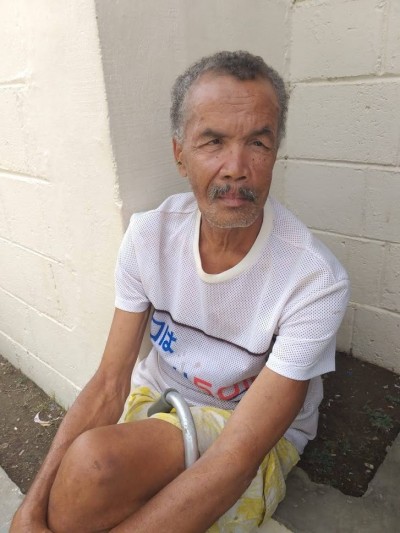
I listen to this song, “Friendship with the Poor Makes Us Friends of God … Friendship with the broken, the lonely … with God”. The recent years of my intense mission life in the Dominican Republic have been filled with many projects, interesting activities, achievements and much learning. Today, though, I am remembering a person. A man named Tomás.
He died a few months ago. He was between 60 and 70 years old, not even he knew his exact age. He was single, and life brought him to Sabana Yegua. His siblings and relatives settled in other towns and visited him only occasionally, when their jobs permitted. Tomás was an active member of our parish, attended Sunday Mass and all sorts of meetings. It’s amazing how we “know” people, but unless we have a more personal relationship with them, we don’t connect with their spark, and that is what happened to me with Tomás. He was “one more”, an older man who got along in life in spite of a significant intellectual limitation that didn’t allow him to work.
Our friendship, or at least our mutual affection, began when a tremendous psoriasis presented itself all over his body. He would lift his shirt without any shame, and showed me his torso, as he used to show others, and explained that it caused him much pain, even though he had used many ointments, to no avail. Many people would stare at him and ask him if what he had was contagious. I refused to give him financial aid so that he could go to a supposedly miraculous “curandera”, a traditional healer, who lived in the capital. And so, right there, I took one the challenge to help him in other ways. We found a specialized dermatologist and went together to Santo Domingo to visit him. What a trip! This big, 6 ft. 2-inch man, had to lean on me to go up the escalator of the Subaway, that he had never seen before. We laughed quite a bit!
After a few months, there were no longer any traces of psoriasis, and he would proudly show me that, lifting his shirt, every single time he saw me! But neither Tomás nor I are the main characters in this story. For, who helped him remember to apply his creams in the morning, at noon and at night? Who kept his little home clean? Who did his laundry? The neighbors. Women neighbors, especially. Who fed him and gave him clothing? They, the neighbors.
In recent months, Tomás became sick again. He was diabetic and was also suffering from other infirmities. We had to rush him to the hospital several times, upset and totally “out of it” because of the diabetes. In the end, he died. And, who dignified his corpse by preparing and dressing it? Who swept his house and served refreshments to all who came to mourn him? The neighbors. Who accompanied him to his grave in the cemetery? The neighbors. The brave and kind neighbors always did it, from the time they met him, with a stunning ease and naturality: caring for a neighbor who could not look after himself was simply something normal for them. Maybe they just know, in the depths of their hearts, that, as the song goes, “friendship with the poor makes us friends of God”.
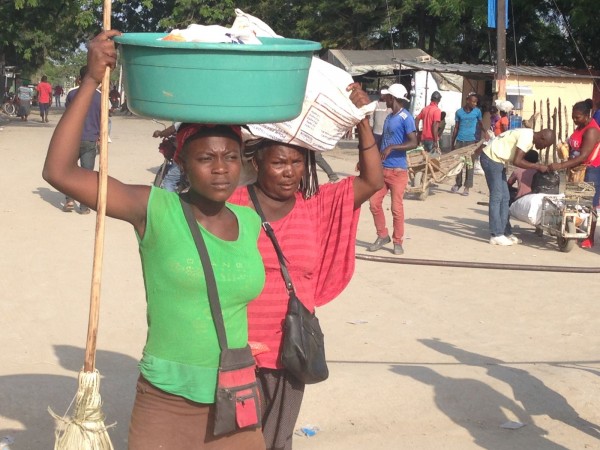
The word, vulnerable, from the Latin, vulnerabilis, is formed by the word vulnus (hurt) and the suffix abilis (-able...indicating possibility). Brought together, the word therefore comes to mean “can be hurt.” I’d like to reflect on this here.
The right to be vulnerable
How beautiful it is to accept the reality of our own vulnerability! So many people put on a tough exterior to hide their pain, their doubt, their sadness, their limitations, their incapacity, their fear. So many people go through life trying to project an image of strength, of being Superman or Superwoman. Especially in recent years, social media shamelessly reinforces (or should I say, we reinforce) having to put on our best face, smiling and triumphant, without showing the true face of the vulnerable people that we are. How great it is to be vulnerable! To know that we are vulnerable is to know that we are human and humble. To recognize that we are vulnerable in front of others gives us the ability to connect with others who are vulnerable (it turns out that we all are!) and gives us the ability to develop synergies and sympathies. In common vernacular, it gives us good vibes. Hopefully, we all know how to be vulnerable with the people who are important to us and in turn need us.
A right that is vulnerable
Having recognized vulnerability as a right, this should not be abused or taken advantage of. In some some circumstances can be a virtue and in others can be a challenge to overcome. But it is a very different situation when vulnerability is something that is imposed from an external circumstance or institution. One thing is to choose to expose our vulnerable nature in a given moment and a very different one is that the government, institutions, groups or people infringe upon our rights (at times systematically) and thus make people be vulnerable. Here I refer to the rights of all, but especially the rights of groups who have historically been the most downtrodden: women, people with disabilities, children, elderly and the millions of people who are living in slums in developing countries (or many times the reverse: in countries that are rapidly “underdeveloping”). The rights to adequate food, health, education, and housing, among others, are being threatened. Those rights continue to be tremendously abused in the 21st century, while the wealth of the few and the indifference of the many continue to steamroll a path, taking with them all that they find in their way. I pray that we dare to expose our vulnerabilities to our family and friends, as people with merciful hearts that are sensitive, beating and suffering. At the same time, I pray that we are strong people for the many whose human rights are violated in such a humiliating way. Thus, we may display our sensitive, beating, suffering and merciful hearts.

I remember that years ago there was in Spain a famous song announcing the lottery. It said, “The hope of every day is to share the ticket of the ONCE”. ONCE (the Spanish National Organization of the Blind) is an entity well known in the country for their lottery tickets, and the money obtained from these tickets benefits the many charitable activities that the organization carries out for the blind. Recently, this song came to mind while I was thinking about our reality in the Dominican Republic. Throughout the country—a nation with an extreme poverty rate of 6% and a moderate poverty rate of 29%—the disproportionate number of posts that sell lottery ticket, which one can find in every corner, even in the most isolated and unfortunate villages, is notable. It has been estimated that there are 154 lottery exchanges for every public school in the Dominican Republic.
Of course, there is a reason for that: it is so difficult to fulfill one’s big dreams with the product of the daily work that many people decide to enjoy life in other ways. They do it by installing satellite dishes and watching endless soap operas, they do it by alienating themselves consuming alcohol, or by celebrating special occasions with big parties. Yet another way is to dream about winning the lottery: for only a little money, one could win a major prize. However, this “small” amount of money, wasted day after day, becomes an important expense —and often an addiction.
If you think about this reality, it could make you want to bang your head against a wall trying to understand how one squanders the small amount of money one obtains from work, instead of better using it to cover basic family needs. Nevertheless, you must place yourself in the other person’s situation, in order to try to understand. Abhijit V. Banerjee and Esther Duflo, in their book “Poor Economics” observe that precisely the little things that make life less tiring are a priority for the poor, who, in place of raging against fate, endure it. Therefore, in many cases, instead of ignoring whims and focusing on necessities, people do just the opposite. They are lenient with themselves because they are skeptical about their supposed opportunities and the possibility of radical change in their lives. And indeed, they have many reasons to be skeptical! They ask themselves if it’s worth the trouble to sacrifice for an unlikely change, which, in addition can arrive too late.
In any case, regarding the lottery, the reality is that in the Dominican Republic its proliferation damages the lowest economic classes. The bishop of San Juan de la Maguana, Msgr. José Grullon, usually promotes from the pulpit an attitude of saving money and organizing the family’s finances as a better way of fighting poverty than hoping for the unlikely prize to come. In his homilies, he often mentions—with his typical common sense— that the only one who gets rich with the lottery is the owner of the lottery business. How right he is!
We really hope that for more and more people the real “hope of every day” might be the hope of a good job, the hope of sending the children to school, and thus gaining the opportunity of a better future. It surely is a stronger bet than the expectation of obtaining a more than improbable prize; most of the time, while waiting for it, the domestic economy suffers—and it’s all for nothing.
In the middle of a violent racist episode, a chapel became a temporary refuge for a Haitian family
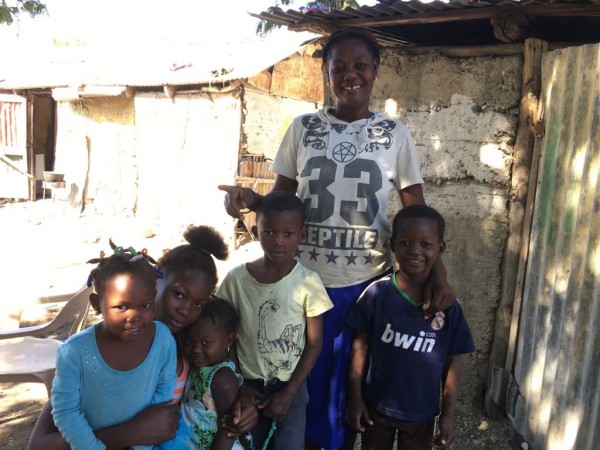
Last month, an immigrant from Haiti robbed and killed a farmer from Sabana Yegua, Azua, Dominican Republic. It was an atrocious act. The perpetrator was immediately captured and is now in the hands of justice. The crime was then followed by a disproportionate and irrational reaction against all Haitians who live in the town, which is the headquarters of La Sagrada Familia Parish. The same night of the crime, a group of people (some with criminal records) took to the streets of the town, beating and, with machetes, attacking several Haitians. They set three homes on fire, robbed and took away property from Haitians, excusing it all as retaliation for the death of the farmer.
From that moment, Haitians in town feared for their lives; many returned to Haiti, and others hid themselves in the fields, outside the village. We, as representatives of the Church, called local authorities and mobilized several organizations to stop the brutality that was occurring, asking for compliance with the law, civility and peace.
Intolerance and xenophobia against Haitians have been present for a long time in the Dominican Republic. They have deep historical, economic and social roots, and produce cyclical altercations and episodes of intolerance. When this happens, there are always voices who make the ridiculous accusation that the neighboring country (Haiti) is carrying out a peaceful invasion of the Spanish-speaking side of the island. Historical episodes from the past are mixed with present day immigration circumstances; yet, they are completely different. In fact, today Haitians are a key part of the economy of the Dominican Republic, as a workforce in agriculture, and there is no doubt that the Dominican Republic’s exports to Haiti are very important for the nation’s commerce.
Joselito, a 45-year-old man from Haiti, arrived in the DR as a twelve-year-old orphan looking for a better life. He admitted to me that he was terrified, and that he needed protection. He and his wife, Melady, have ten children, and as is the case with many families, it is very difficult to give their children all that they need. Yet, Joselito and Melady have never committed a crime and are legal residents in this country. Their children were born here and are now completing high school. He was afraid that they could be the target of the anger of those attacking Haitians just because of their nationality.
We decided to move Joselito and his family to the new chapel in Tábara Abajo, a town located a few miles away from Sabana Yegua. Therefore, this little chapel, which was inaugurated in December, had the honor of sheltering a foreigner in need of lodging. For one week, the family stayed there, without beds or furniture. At first some neighbors were suspicious, but common sense prevailed. In fact, a neighbor told us that many Dominicans have family in the USA, Spain, Italy and Switzerland: these are people who have immigrated in search of work, and none of them would like to be judged because of a crime committed by another person. Those who sparked the outrage tried to continue the talk of expelling all the Haitians from town. However, they were not supported, and finally things returned to normal. Nevertheless, it’s important not to lower our guard, for it is obvious that what happened was very, very grave.
It is essential that the law may act against those who commit a crime, regardless of their nationality, and we must promote coexistence, respect and dignity for all people. In any case, the church which is made of living stones (that is, all of us) and the church/temple (that is, the building) should always be a sheltering and welcoming place, a true home for everyone. On this occasion, our humble chapel at Tábara was just that, in a concrete and tangible way.
Reflection on the Feast of Candlemas
On February 2, the Feast of Candlemas, my parents, who have been married 59 years, usually attend the annual celebration Parents of Alumni of the Marists Brothers’ school in Badalona (Spain). On that day, we commemorate the presentation of Jesus in the temple. It is a special day because in many places spouses also renew their marriage vows, and World Day of Consecrated Life is celebrated. This beautiful feast prompted me to write this reflection.
The presentation of Jesus at the temple by his parents was an act of obedience to the Law of Moses, according to which a child had to be presented at the temple 40 days after his birth. February 2 is, of course, 40 days after Christmas. According to the Law, the first born son of each home belonged to our Lord, and parents had to present the child and pay a ransom for him at the temple.
The presentation of spouses at the temple, to renew their marriage vows with each other and the Lord, is very appropriate for this day. So, too, is the celebration and renewal of vows for those who have consecrated their lives to God. Like the first born of each Jewish family, they also belong to the Lord. This belonging of believers is characterized by fidelity.
Sometimes it seems that fidelity, the “forever” option, is not in style nowadays, except for those who want tattoos. In a time like ours, where options are abundant, with a great range of opportunities and many open doors during the trajectory of one’s life, it has become difficult to choose definitively one road over everything else. Isaac Riera, MSC, wrote about “the weakened will” and claimed that “modern man is full of stimulation, sensations and desires, but lacking in willpower”. Perhaps this explains the lack of perseverance in some marriages and even the decline of vocations to a consecrated life.
Nowadays, fidelity has for some a negative undertone, as if it were a value of bygone days, related to resignation and prohibitions. However, it is actually a free, beautiful and creative exercise. Faithfulness is a choice, a promise, a fundamental option, whether it be as a couple, to children, to a principle or to a profession. It implies coherence with oneself and perseverance to face many obstacles.
Bishop José Grullón, of San Juan de la Maguana in the Dominican Republic, speaking recently about perseverance to a group of couples who were happy with their marriages, posed the following question to them: “What is better, to win someone’s love or to preserve it?” To the response of many that “to preserve” is better, he explained that “to preserve love” is to leave it frozen, paralyzed. On the contrary, “to win someone’s love” is something that must be done every day. The Spanish songwriter Victor Manuel says it in one of his songs: “Day to day I grow within, because I love you. I keep fanning the fire”.
Today, Candlemas, we remember our fundamental option and our fidelity, a creative and renewed fidelity. It is a faithfulness that we pursue day to day, every day, fanning the fire to keep alive the flame. Because our choices and fundamental options, not just our tattoos, are forever.

At the beginning of Lent we meditated on the contingency of our existence, about the teachings of the phrase, “You are dust, and to dust you shall return”. We pondered the benefits of being well aware of our finite nature. Today, on the great feast of Easter, we seek the road to the Resurrection.
Easter is the celebration of new life, new creation, rebirth, transformation; it is happiness, interior peace, profound joy. Perhaps in life we don’t seek these goals following a straight linear road, but rather through a cyclical route, transported by the waves of life. We go forward step by step, not without stumbles and setbacks, maybe taking some detours... pursuing a slow spiral, and we do it embracing the cross. That personal cross, those limitations that we are conscious of, those hidden selfish acts, the jealousies and lazy habits that betray our lofty goals; it is simply necessary to bear those crosses. There is no way around it: As the evangelist says, “Take up your cross and follow me.” A key to the cross is accepting, embracing, gathering up everything that is difficult to bear. Accepting, for instance, how silly we can be at times; accepting the deceptions in which we entrap ourselves, like in the web of a spider; accepting the illness that reveals to us how human and fragile we are; accepting the dependence on others for so many things; and accepting and embracing the imperfection of our world, of the humanity that God created free, with all its miseries and vanities, capable of the most beautiful gestures and the worst atrocities.
Once we have accepted all of this, once we have embraced the cross, with the strength and grace of God, we lend the Father a hand in His work, as His beloved children, as His hands, His feet and His eyes. It is then when we can draw closer to His Son, in our attitudes, our tenderness, in our indiscriminate acceptance of others. It is then when we can draw closer to Jesus in our fight against injustice, against the merchants in the temple, against the hypocrisy of the Pharisees, against the indifference of the Levite and the priest toward the wounded man. It is then when can draw closer to Jesus as He prays in the garden, asking for God’s will, and not our own, to be done.
It is then when we discover the joy of the Resurrection, when hope is reborn, when solidarity reigns. It is then when profound happiness grows, when fear ends and love is renewed. It is then when we live the Feast of the Resurrection.

Dolors Puértolas
I’d like to begin this reflection considering two words that we today use often (and maybe together in the same sentence): “selfie” (a picture taken of yourself with your mobile phone) and a celebrity.
The sociologist Neil Postman[1] says, recollecting something often noted, that our current culture is a culture of the image (or television), as opposed to the previous culture that was of the book and reading (or printing). And certainly, the image dominates in this century well above the written text. A long list of authors have mentioned this paradigm shift.
Some time ago it was autographs that proved that we had met someone, but now it is the "selfie" we can show from our phone, share on Facebook, whatsapp or by other means. And it seems that a lot of people are interested in having "selfies" with celebrities. The passion for "selfies" may denote an emphasis on the importance of one’s self-image rather than one’s values, insight or thought. It can also suggest some self-centeredness. In the case of "selfies " with celebrities, it seems that we are talking about getting some kind of trophy to show off to others.
A few days ago I considered taking a "selfie" with someone who has been in a certain way a celebrity for me in this past year. This is someone that I value as important and is significant for me. In August we learned of the need of a young woman, 27 years old, of an urgent heart surgery. We contacted friends and some people who had met Altagracia and knew of her disease. Thanks to the response of many, she was able to have her surgical procedure done successfully in October, recovered and is in good health.
When I went to visit her, I wanted a "selfie" with Altagracia. And I took it. I considered that a woman of her age, married, who lost their first baby by complications in the pregnancy, and is at this later age studying to have a degree due to lack of financial resources, who is struggling to support a family, and she had to face not only a surgery of life and death but also the challenge of not having resources and be forced to seek funds anywhere… That is for me a well-rounded celebrity!
And also she is a celebrity because it was around her person and her need that a number of people felt touched and responded generously to the call. So doubly important.
If we stop to remember from this past year an important person with whom we would take a picture, perhaps what will come to mind is a different kind of celebrity: a fighter for human rights, a person with good values , a person who has suffered ... Each of us will have our own “important” person, whether it be a relative, an acquaintance or even (why not), many anonymous people, who may have abandoned a country fleeing from hunger, to escape war or searching for a better future for their children. Those we can think of would be so many that would not fit into a single "selfie." Let us look back for a moment on the past year and imagine which celebrity we’d like to make a selfie with.
PS: (I never published the “selfie,” it didn’t turn out, but it is well guarded in my heart).
[1] Neil Postman, Divertirse hasta morir, La Tempestad, Barcelona 2013.









